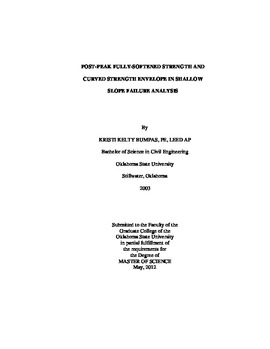| dc.contributor.advisor | Gregory, Garry H. | |
| dc.contributor.author | Bumpas, Kristi Kelty | |
| dc.date.accessioned | 2014-04-17T19:55:50Z | |
| dc.date.available | 2014-04-17T19:55:50Z | |
| dc.date.issued | 2012-05-01 | |
| dc.identifier.uri | https://hdl.handle.net/11244/10112 | |
| dc.description.abstract | It has long been recognized that highly plastic clays and stiff fissured clays may become "fully softened" in shallower zones of slopes and undergo significant strength loss over time. However, the use of fully softened strength (FSS) in clay slopes has only begun to come into use in slope stability analyses in recent years. Previously, many slopes were analyzed using peak strengths from standard laboratory tests which typically produced unrealistically high factor of safety (F) values compared to actual long-term performance of the slopes. For slope ratios of 3H: 1V to 4H: 1V (3:1 to 4:1) and heights in the range of 15 to 25 feet, stability analyses using peak FSS much more closely model the actual failures. However, using peak FSS values for first time slides in many cases still require unrealistically high pore pressure assumptions to produce F values near 1. This indicates that the average FSS along the slip surface is actually between residual and peak FSS. This research study was conducted to evaluate a range of post-peak FSS values at 25, 50, and 75 percent incremental difference between residual and peak FSS from existing correlations and available existing FSS test results. Power curves were fit to the data points to develop coefficients for the full range of post-peak FSS values. These coefficients were used to perform limit equilibrium analysis of a range of slope ratios and heights representative of slope failure conditions observed in the field. Pore pressure assumptions were varied in the analyses to produce F values near 1. The analyses show that post-peak FSS values between residual and peak FSS produce more realistic pore pressures for slopes in non-water retention facilities such as highway slopes. The large data base of power curve coefficients developed in this study is useful for stability analyses of slopes with a wide range of clay soils susceptible to fully softened conditions. | |
| dc.format | application/pdf | |
| dc.language | en_US | |
| dc.publisher | Oklahoma State University | |
| dc.rights | Copyright is held by the author who has granted the Oklahoma State University Library the non-exclusive right to share this material in its institutional repository. Contact Digital Library Services at lib-dls@okstate.edu or 405-744-9161 for the permission policy on the use, reproduction or distribution of this material. | |
| dc.title | Post-peak Fully Softened Strength and Curved Strength Envelopes in Shallow Slope Failure Analysis | |
| dc.type | text | |
| dc.contributor.committeeMember | Cross, Stephen A | |
| dc.contributor.committeeMember | Lewis, M. Phil | |
| osu.filename | Bumpas_okstate_0664M_12054.pdf | |
| osu.college | Engineering, Architecture, and Technology | |
| osu.accesstype | Open Access | |
| dc.description.department | School of Civil & Environmental Engineering | |
| dc.type.genre | Thesis | |
| dc.subject.keywords | curved envelope | |
| dc.subject.keywords | fully softened | |
| dc.subject.keywords | post-peak | |
| dc.subject.keywords | shear strength | |
| dc.subject.keywords | slope analysis | |
| dc.subject.keywords | slope failure | |
